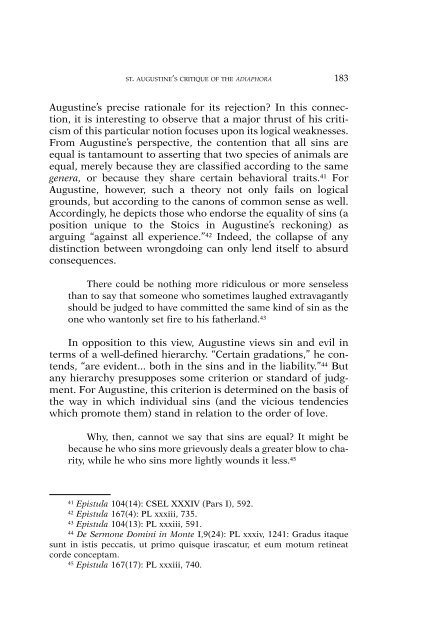Vol. XXXVIII / 1 - Studia Moralia
Vol. XXXVIII / 1 - Studia Moralia
Vol. XXXVIII / 1 - Studia Moralia
You also want an ePaper? Increase the reach of your titles
YUMPU automatically turns print PDFs into web optimized ePapers that Google loves.
ST. AUGUSTINE’S CRITIQUE OF THE ADIAPHORA 183<br />
Augustine’s precise rationale for its rejection? In this connection,<br />
it is interesting to observe that a major thrust of his criticism<br />
of this particular notion focuses upon its logical weaknesses.<br />
From Augustine’s perspective, the contention that all sins are<br />
equal is tantamount to asserting that two species of animals are<br />
equal, merely because they are classified according to the same<br />
genera, or because they share certain behavioral traits. 41 For<br />
Augustine, however, such a theory not only fails on logical<br />
grounds, but according to the canons of common sense as well.<br />
Accordingly, he depicts those who endorse the equality of sins (a<br />
position unique to the Stoics in Augustine’s reckoning) as<br />
arguing “against all experience.” 42 Indeed, the collapse of any<br />
distinction between wrongdoing can only lend itself to absurd<br />
consequences.<br />
There could be nothing more ridiculous or more senseless<br />
than to say that someone who sometimes laughed extravagantly<br />
should be judged to have committed the same kind of sin as the<br />
one who wantonly set fire to his fatherland. 43<br />
In opposition to this view, Augustine views sin and evil in<br />
terms of a well-defined hierarchy. “Certain gradations,” he contends,<br />
“are evident... both in the sins and in the liability.” 44 But<br />
any hierarchy presupposes some criterion or standard of judgment.<br />
For Augustine, this criterion is determined on the basis of<br />
the way in which individual sins (and the vicious tendencies<br />
which promote them) stand in relation to the order of love.<br />
Why, then, cannot we say that sins are equal? It might be<br />
because he who sins more grievously deals a greater blow to charity,<br />
while he who sins more lightly wounds it less. 45<br />
41<br />
Epistula 104(14): CSEL XXXIV (Pars I), 592.<br />
42<br />
Epistula 167(4): PL xxxiii, 735.<br />
43<br />
Epistula 104(13): PL xxxiii, 591.<br />
44<br />
De Sermone Domini in Monte I,9(24): PL xxxiv, 1241: Gradus itaque<br />
sunt in istis peccatis, ut primo quisque irascatur, et eum motum retineat<br />
corde conceptam.<br />
45<br />
Epistula 167(17): PL xxxiii, 740.
















